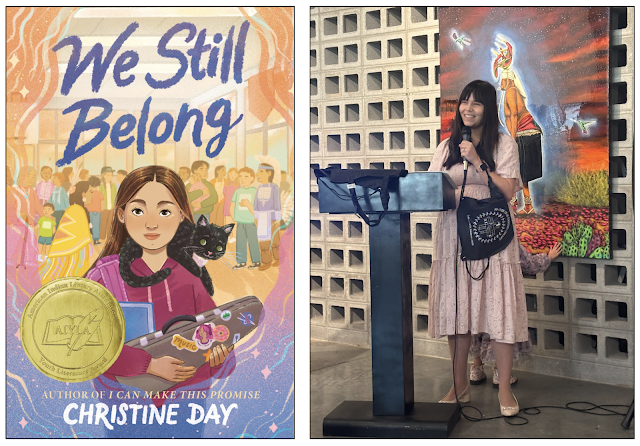A few teachers have written to ask me about the Native Americans unit in Core Knowledge Language Arts (CKLA) for grade 5. For them and others interested, I've downloaded it and will make notes here as I go through it (if you see a confusing note, let me know! These are rough notes. If they don't make sense, tell me and I'll try again). I'll date each entry. The file is 280 pages long. You'll see that I'm including a SUGGESTION section here and there.
May 6, 2025
Let's start by looking at the cover. As you see, I've placed red question marks on it to indicate my concerns:
First thought? Why did the publishers use a sepia-toned photo? Images like that suggest we are a people of the past. I don't know how many districts in the US use this curriculum but research studies show that state standards fail to show us as people of the present day. See, for example, "Manifesting Destiny" by Shear, Knowles, Soden and Castro. It was a major study that got a lot of press when it came out in 2015. If the photo on the cover is indicative of the materials in this curriculum, that's definitely a problem.
SUGGESTION: Develop a critical literacy unit on analyzing photos of Native peoples. Note and compare time periods depicted, color versus black/white, and photographers. I'm guessing the photo on the cover is one taken by Edward S. Curtis. There's more and more articles available that let readers know that he (and other photographers) manipulated photos to convey a romantic image. Here's one example of what he did. On left is the original. See the clock between the two men? It isn't in the photo on the right. For more information, see Edward S. Curtis: Romance vs. Reality.
Scrolling down to see the opening pages, I find a 2014 copyright year which is a year before Shear's study. Over ten years have passed which is plenty of time to have revised the activity book.
Page 1: "Native Americans by Region" starts by asking students to "Write the name of the region in which each Native American tribe, or group, lived."
The instruction does not bode well! Note that it is in past tense ("lived"). I note, too, that it says "tribe" or "group." In fact, the best word for us is nations. We were nations before the US was a nation. Early Europeans recognized us as nations. Their leaders and leaders of Native Nations entered into diplomatic negotiations. The outcome? Treaties. You read about them in school but the key fact that they're the outcome of diplomacy doesn't get enough attention. If teaching materials highlighted that fact, we'd see nation rather than tribe in materials like this activity book.
After that instruction, there are two pages that consist of a paragraph of information. Above each paragraph is a blank line. Students are supposed to write down a "tribe" or "group" name on that line. Reading through the paragraphs, I see that each one is written as if the people being described no longer exist. All the verbs are past tense. I don't have the curriculum the activity book is referring to, but I can tell from the content that the first paragraph is meant to be about a Plains Nation. Some of the sentences will seem fine to readers who have been taught to think of us as people of the past. People who notice? Native people and critical thinkers! The last sentence in the first paragraph says that homes "were made out of animal hides and were called tepees." If we change the verb tense, you'll see a huge difference. "are made out of animal hides and are called tipis." See the difference?
The second paragraph is about Pueblo people but verbs throughout are past tense. I'll list them: lived, lived, grew, provided, lived, learned, built, learned, wove, coated, baked, used, planted, used. The facts? We still live in that region with, and trees still grow there. We still use them to build with. We still farm with small water supplies. We still build homes out of clay bricks and stone. We don't plant cotton to make clothing -- we buy our clothing just like most people do! We still weave baskets.
I'm going to pause note-taking/sharing for now.
SUGGESTION: If your school uses this curriculum, how about you do a critical literacy lesson on verb tense? I'd love to see students doing edits to these two pages! And photos of these edits could be sent to the publisher. I was going to suggest putting them on social media but that's risky, these days. Send them to me! I'll share them.
















